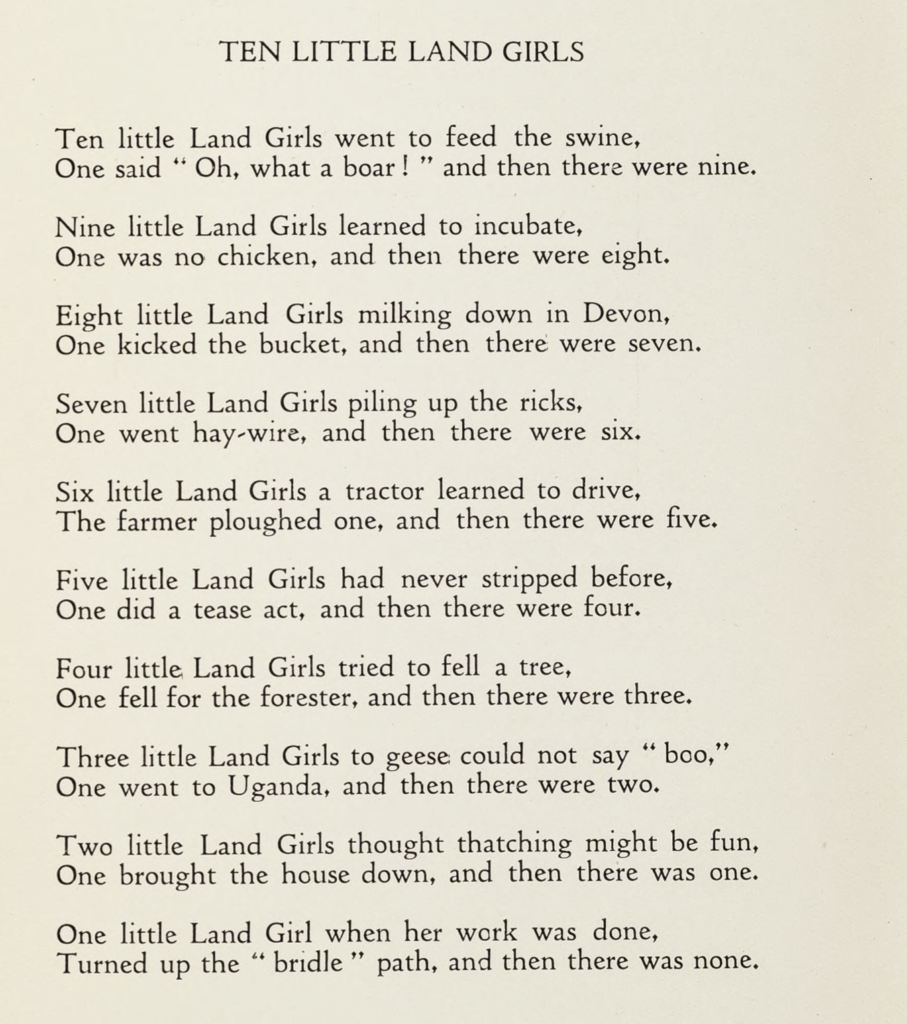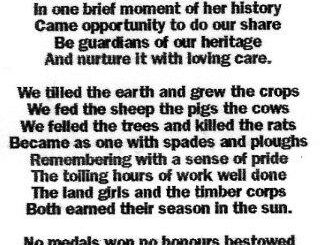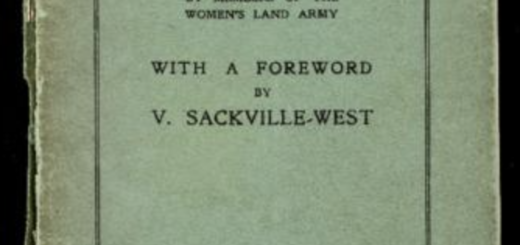Women’s Land Army poetry: an appreciation of subversive voices
Today to mark World Poetry Day, I am thrilled to launch a new series of monthly blogs, written by Geraldine Roberts-Stone. As part of her PhD research, Geraldine examined some of the poems penned by Land Girls during the Second World War.
During WWII, members of the Women’s Land Army were encouraged to write poetry as a leisure activity. These poems often appeared in ‘The Land Girl’ magazine, with an anthology, Poems of the Land Army, published in 1945.
Its editor, Vita Sackville-West, found that subject matter tended to fall into two categories – humour and nature. These topics seem to correspond with how “land girls” were portrayed in recruitment posters – healthy and perpetually cheerful. However, is there more to these recreational poems than meets the eye?
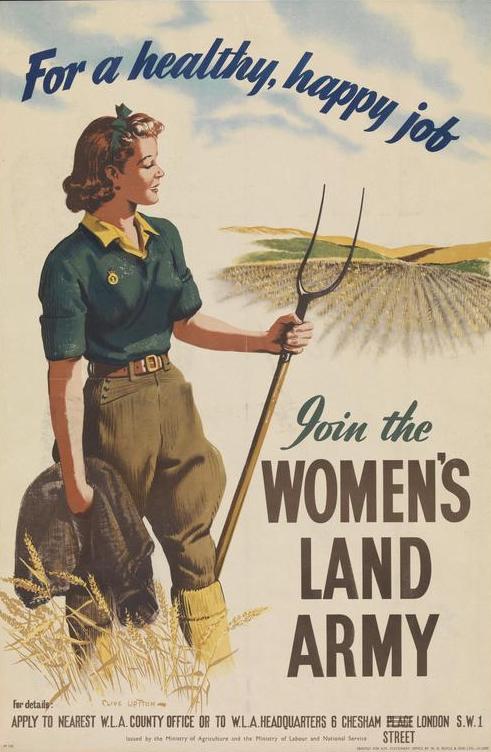
Kate Millett reminds us of the need to consider “the social and cultural contexts if literature is to be properly understood.” Gill Plain has argued that WWII was a period of “unprecedented governmental control” over women’s lives, whilst Jenny Hartley notes that female fidelity was “national policy.”
This preoccupation with women’s behaviour, continually communicated in public information films, popular media and cinema, arose from anxiety about two specific issues.
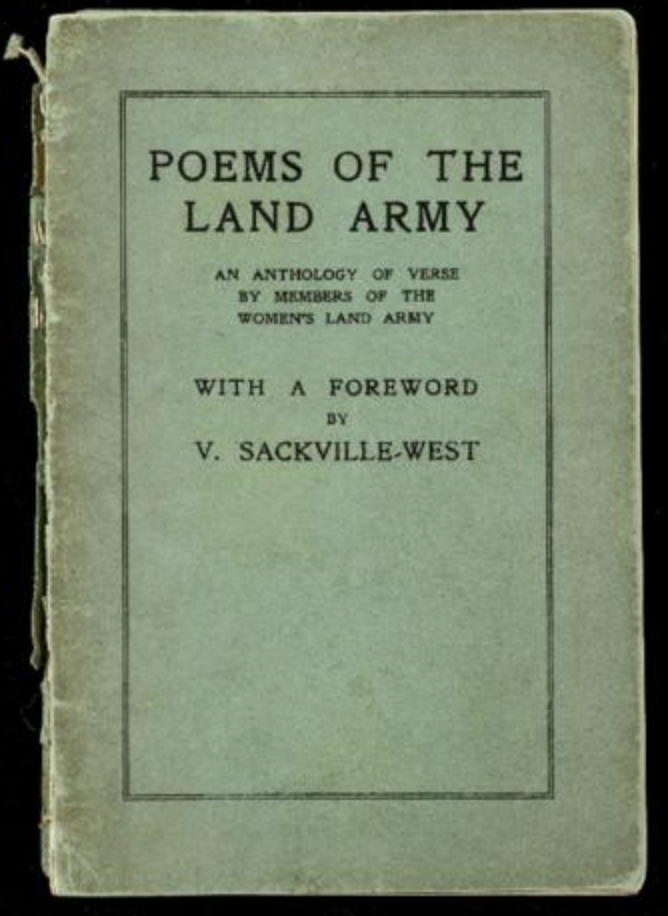
Source: LSE
Firstly, threats posed to the family unit and the sanctity of “home and hearth” from more women out in the workplace, serving the war effort. Secondly, the need to preserve the morale of the fighting man, which required women to be faithful, decorous and well-groomed.
Taking these issues into account, I wish to argue that a closer reading of poetry of the Women’s Land Army is needed.
Mindful of the restraints on women, the approved activity of writing poems for relaxation provided a vehicle through which “land girls” could vent their anger over issues such as poor pay and conditions (the WLA was often viewed as the “Cinderella” service in comparison to other women’s forces).
Furthermore, the recurring topics of humour and nature became powerful weapons. Firstly, the humorous tone, and use of comic forms such as the limerick are, rather in the fashion of nursery rhymes, used to explore darker topics such as sexual abuse experienced by some WLA members in the course of their daily work.
Moreover, the humour sometimes ventures into the field of sarcasm, affording the poets the opportunity to make political and social comment.
Secondly, it is possible to read the natural imagery metaphorically. Issues dealt with through the, seemingly harmless, references to the surrounding countryside include sexual liberation, forbidden lesbian desire, gaining a sense of personal freedom and empowerment through work, and criticism of imperialism.
All of these issues challenge the emphasis on self-sacrifice, restraint and national unity, which prevailed on the home front.
Simon Featherstone has argued that no genre is more dominated by the male voice than the war poem. Therefore, women poets responding to war can find their work marginalized or dismissed as worthless; as women, they are viewed as having no “authority” with which to speak.
However, if we consider that the restrictive context of WWII may have obliged women to resort to writing in a “coded” language, the poetry of the WLA produced during World War Two provides an important literary, social and historical record. It reveals the “truth” of real people’s lives and concerns behind the mythology of the Blitz.
Biography
Geraldine Roberts-Stone is a School Chaplain, qualified English teacher and PhD candidate, based in Liverpool. Her thesis argues that the (often overlooked) poetry written by women in response to World War Two is radical and subversive.
Bibliography
Featherstone, S (1995) War Poetry: An Introductory Reader London: Routledge
Hartley, J (1997) Millions Like Us: British Women’s Fiction of the Second World War London: Virago
Millett, K (1969) in Moi, T (2002) Sexual/Textual Politics London: Routledge
Plain, Gill in Hamill, F Miskimmin, E and Sponenberg, A (eds.) (2006) Encyclopaedia of British Women’s Writing 1900-1950 Hants: Palgrave Macmillan
Sackville-West, V (ed.) (1945) Poems of the Land Army London: The Land Girl
Ten Little Land Girls, published in ‘Poems of the Land Army’ in 1945.

